Norberto Tavares
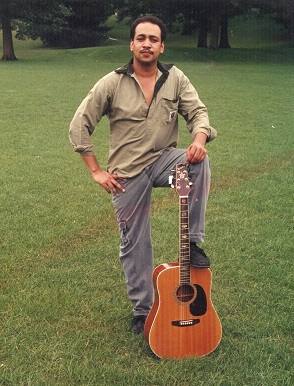
Norberto dos Santos Tavares was born in Assomada, Santiago Island in 1956 and died in New Bedford, USA in 2010. He was an instrumentalist, singer and composer. He is considered a reference to artists from different generations. Norberto Tavares made history in the music of Cape Verde as a precursor of the musical movement that in the early 1980 helped funana transitioning from rurality to a musical genre enjoyed by Cape Verdeans. On his LP Volta pa fonti, released one year before Bulimundo’s first album, appears funana in a modern version – “Mariazinha leban bu palavra” -, exactly what will determine the success of this group. It is Katchas himself, the leader of Bulimundo, that recognizes the precedence of Tavares work: “If he had the conviction to make the first album in the history of funana, the unforgettable Norberto Tavares would have done it”, refers Katchas to the Tribuna newspaper (December 1986).
Four years before Volta pa fonti, he walked in a studio in Lisbon for the first time to record the first album of the Black Power group. It was 1975, Norberto Tavares was 19 years old and had arrived to the Portugal’s capital of Lisbon around three years before with the intention of studying.
A group of young Cape Verdeans was looking for an organist and he was the chosen one. With that group he recorded three LP: Black Power – Vol. 1 (1976); Nos Cabo Verdi di Speranca (1977), title that is also from his own composition that was a success at the time and it is referenced as an authentic anthem to the islands and the Cape Verdean people; and Black Power is Back (1978) that praises the African idiosyncrasy.
The group was together until 1979, when the young man from Assomada records his first solo album, Volta pa fonti.
“I have always wanted to record an album with my own ideas, with Cape Verdean music, specifically music from Santiago but in the group that was not possible because most of the members didn’t understand my reasons to want to record funana and batuku. When the band split up, I went to the studio to record by myself, I played almost all the instruments”.
Norberto Tavares regarding the album Volta pa fonti, in Cabo Verde & a Musica – Dicionario de Personagens
Other names that appeared, as special guests, are Teck in the tenor saxophone, Manuel Teixeira in the drums and a female voice in the choir, Maria Isabel Vicente. “While recording the first Black Power album, I wanted to introduce funana, but the other members did not understand the idea. Half of them were from Praia, the other half from Sao Vicente. But I was able to introduce batuku, “Mininos teni fome”, in this first album, Black Power vol.1” (Cabo Verde & a Musica Dicionario de Personagens). This was most likely the first album with a song with batuku rhythm.
After the album release, Tavares travels to the USA, where he resides until his death. He creates a new group with his brother Antonio (Toto Tavares), who was also a member of the Black Power. With this group he wanted to continue the work he started in Portugal. They didn’t keep the name because it wasn’t their idea and also because the expression black power was associated to the black movement in the USA. “Then we decided to keep the power but replace the black by tropical” you can read on their entry in the personality dictionary above mentioned.
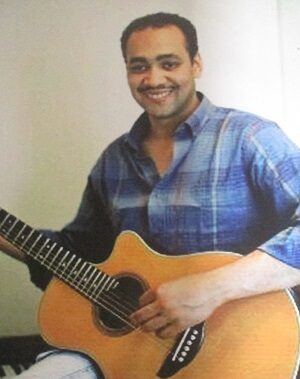
Under his leadership, Tropical Power recorded Mundo sta di Boita (1982) and Tropical Power Musical Connection (1985). The group lasted until 1986. After that year they have some on and off encounters. Tavares keeps recording as a solo artist: Jornada di um Badiu (1989), Hino di Unificacao (1991), Maria (1998) e um Best Of (2005) that gathers old successes and some unpublished themes. Dirigentes inconscientes (2001), with three songs, didn’t get to be distributed to the public. It had as a goal to “raise awareness about politics to the people”, stated Norberto Tavares, stating that “I am not a politician but I believe that if God allowed me to see things that the people are not seeing, it is my duty to alert them (…) I feel sorry that most artists do not believe that they should have a political voice because they will have obstacles if they do” (Cabo Verde & a Musica Dicionario de Personagens).
Critical lyrics were constant in his career, sometimes creating misunderstandings. In the first Block Power album, in the height of euphoria of independence he creates “No cre liberdade” and “PAIGC qui ta branda nhos”. This song according to the composer was misunderstood. “They thought I was saying that PAIGC was a tough party, executioner, but that’s not what I meant, I was saying that it was a party that could give strength to the order and law. Another example was “Boita di mundo”, from Tropical Power’s first album in 1982. “I mention a lot of things in this song and people thought I was referring to the party in power. I was simply talking about change, things that happen in the world. Some of my generalizations also applied to the Cape Verde government. But it wasn’t anything specifically directed to the government”. (Cabo Verde & a Musica Dicionario de Personagens). The LP Jornada di um Badio of 1989, brings in its cover the following warning: The song ‘Na nha juiz e mi que ta manda’ is not criticizing a particular government or local entity but portrays in general the current sociopolitical structure of the planet”. The following year while performing in Praia, the artist was accused of “transform music and amusement sessions into political rallies and with the excuse of explaining his compositions, get meshed in cheap political defiance and populist behavior”, stated in Voz di Povo (09.06.1990). It was a period of change to the multipartisanship, when susceptibilities were ultra sharp. If Tavares refuses any political party sympathy, the press attribute him “a very influential role in the process of political change, at the time favoring MPD”, but at the same time refers that the musician “comes back 10 years later to fight the same party that according to him founded in Cape Verde “a democratic dynasty in disguise”(www.visaonline.com 12.01.2001).
Norberto Tavares has composed around 260 songs, of which only a small part was recorded. Him becoming ill at 24 years old, from diabetes that was undiagnosed nine years after, highly affected his creative process: “I didn’t know the reason, but I couldn’t think as clear as before. I kept composing, working on music, but it was something that required a greater effort. It is possible to tell that there is several years of intermission between Mundo sta di boita (1982) and Jornada de um badio (1989)”.
This makes him start to work for other musicians, playing, doing production and arrangements, launching his own recording label named Mensagem.
“It has to be something that comes naturally, like a message that comes in the air and I have to put it out there. When that happens I grab the guitar or piano and in 10, 15 minutes the music is done”.
Norberto Tavares regarding his way of composing, in Cabo Verde & a Musica – Dicionario de Personagens
Regarding his own compositions in an interview in 2005 he stated: “It is incredible that the songs I composed between 12 and 24 years old until I got sick, I remember them all, and it is over 200. But what I composed after that I have a difficult time remembering. I consider the ones I composed between 12 and 24 years old the best. Something curious is that since I started composing at a young age, my lyrics were so deep that still surprise me to this day, things that I haven’t learned with anyone, not even from books. “(Cabo Verde & a Musica – Dicionario de Personagens).
Norberto Tavares grew up listening to mornas and koladeras interpreted in various instruments that his father played. It was only until 9 years old, at the time of his father’s death. So he didn’t learn from him, but the sounds that his ears had kept reappear in his memory when he starts to practice alone. “When I listened a song in the radio I used to think: I can do this”, he said. At the same time, since he was young he was very interested when he used to see the peasants arriving to the village with the Accordion on their chests to play on Saint Catarina’s Day or other festivities. It was on times that he spent on his uncle’s house that lived in Matinho-Boca Larga that he had close contact with rural music of Santiago and he felt “the soul of Cape Verdean people, their humility, simplicity, and honesty… all of this delighted me” (Cabo Verde & a Musica: Dicionario de Personagens). Later he asked the priest’s permission to use the church’s organ and ends up joining the youth group of the parish until he emigrated to Lisbon in 1973 and became a professional musician. During his last years and because of his frail health, generated in Cape Verde and Cape Verdean Diaspora a wave of commotion and solidarity, leading to find a donor that allowed a kidney transplant.
Approximately at the same time, it was launched a documentary by the north american ethnomusicologist Susan Hurley-Glowa about his artistic career: Journey of a Badiu: The story of Cape Verdean-American Musician Norberto Tavares (see excerpts below). In 2021, the same author published the book Songs for Cabo Verde: Norberto Tavares’s Musical Visions for a New Republic, about the artist’s work as a lens to analyze the recent history of the country.
In 2008, the government of Cape Verde transformed the Museum of Tabanka, in the center of Assomada, into the Norberto Tavares Cultural Center, space that hosted the artists’ funeral ceremony at the end of December of 2010. At the time it was highlighted the spiritual aspect of the composer’s experience (at some extend because the fact of his brother Antonio had converted to the Protestant Confession), but it is true that even before, Tavares affirmed that he was deeply believer, even though he was away from the religious practice. “I believe that we are in this world not by chance, but each one of us has a mission to accomplish” (Terra Nova, August 1990).
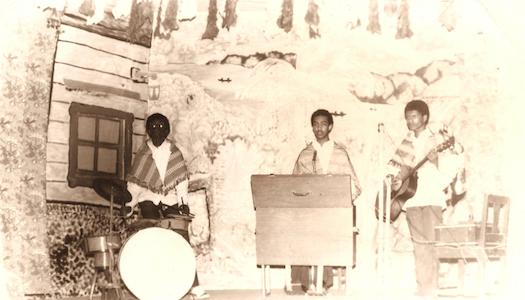
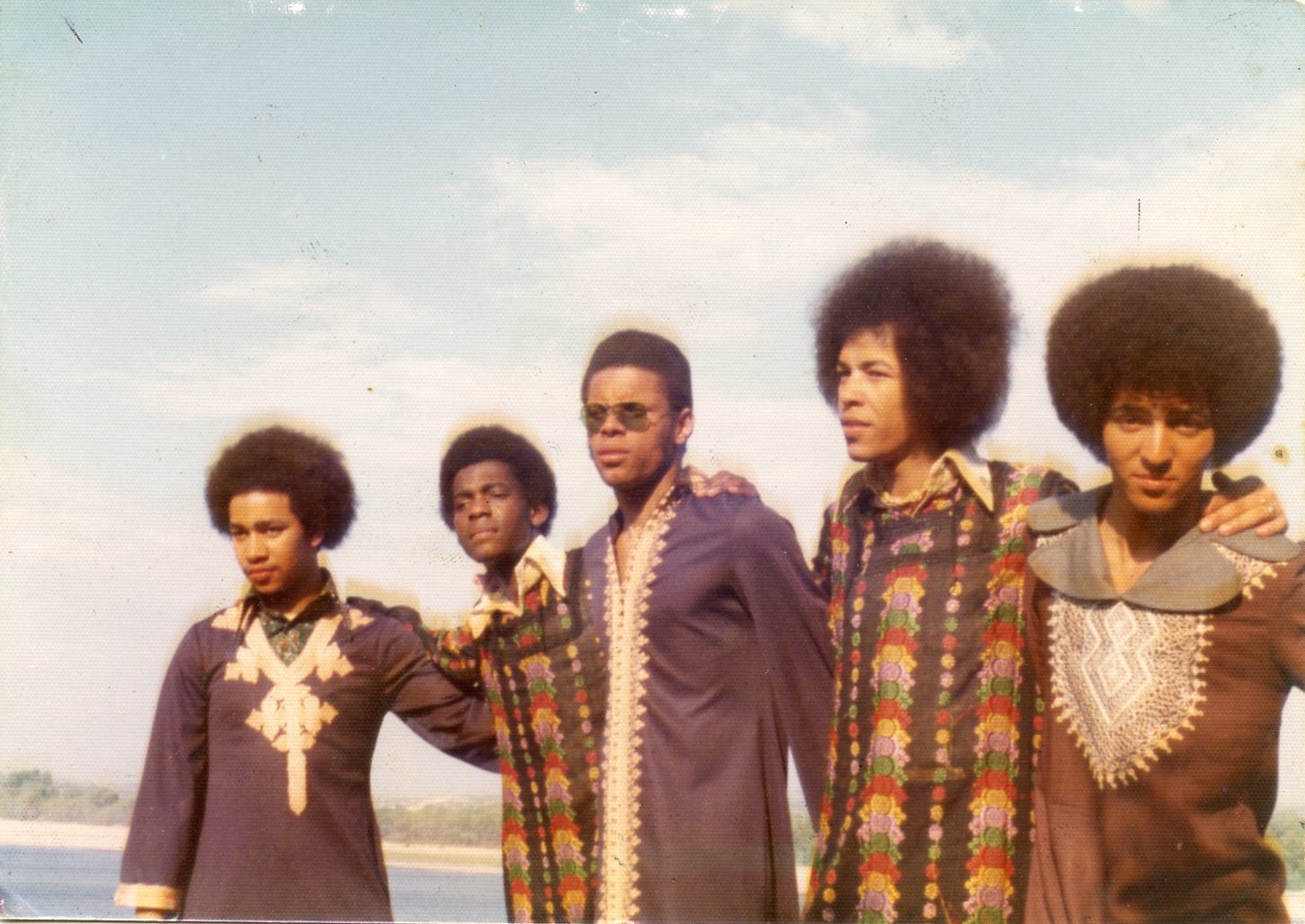
Right: during the Black Power time in Lisbon. Norberto is the first in the left, with com Zé, Djô, Djon e Manuel (photo courtesy of José Sanches Tavares)

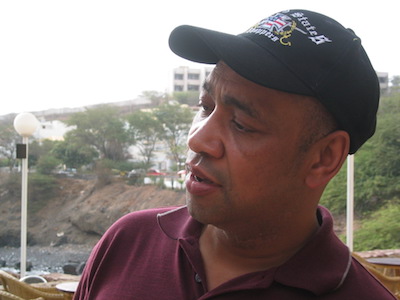
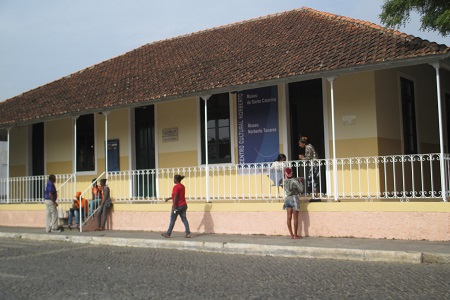
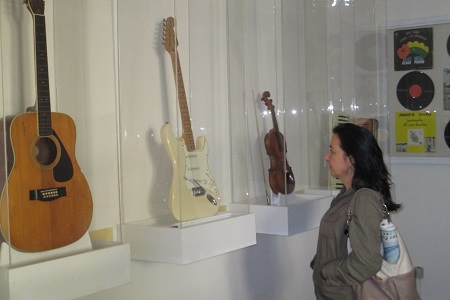
Ouvir
Thanks for the collaboration in the research: Mário Silva; Djinho Barbosa